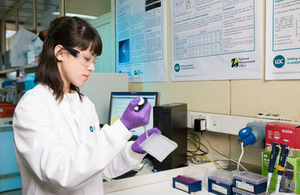2014 Government Chemist conference report and presentations
Experts outline how science, regulation and integrity within the food industry can combat food fraud during a 2-day conference in November.

An image of a scientist carrying out qPCR DNA sequence testing
Effective intelligence and enforcement, reliable measurement procedures and suitable reference materials are integral in the fight against food fraud; this is the take home message from the 2014 Government Chemist ‘beating the cheats’ conference.
Over the 2-day conference, an audience of public analysts, government officials, industry and public sector scientists, academics and leading food experts heard how sound measurement science has a fundamental part to play in ensuring the safety and integrity of the food chain.
They heard from scientists about the latest analytical techniques that can be used by manufacturers to monitor their production processes, by suppliers to test their produce and by enforcers to ensure compliance with regulations. This included the latest techniques for determining the species of meat in processed food and for assessing whether carry over occurs in meat processing plants. They heard how isotope ratio measurements can be used to help determine the origin of foods and therefore establish authenticity and the accuracy of labelling.
The Food Standards Agency outlined the steps they have been taking to prepare the industry for legislation changes – particularly the new allergen labelling rules that came into force on 13 December. The presentation outlined ‘good practice’ and emphasised that while customers need to ask for information about allergens, caterers need to ensure that all of their staff know when allergens are present in the food they provide.
Professor Chris Elliott’s keynote presentation, ‘Securing the integrity of our food supply’, provided the context for the conference and included updates on the changes that are being made across the food industry following his official review into the integrity and assurance of food supply networks that was triggered by the horsemeat incident in 2013.
The spotlight turned on food fraud outside the UK during a talk by Michael Rosenmark, from the Danish Food Flying Squad, which provided an insight into the work of his specialist unit and the powers it has to tackle food crime in Denmark. Yiu-chung Wong, from the Government Laboratory in Hong Kong discussed the authentication of Chinese medicinal food and the detection of marine toxins in seafood.
Derek Craston, Government Chemist, said: “We had a fantastic mix of speakers covering a huge number of issues around food fraud and authenticity and the approaches that can be taken to tackle this. Professor Chris Elliott set the scene at the start of the conference before our expert speakers talked about different areas of science, measurement and quality control. I was delighted to see so many people attend the conference and contributing in an interactive session looking at priority areas for future research run by the FSA.”
The 2014 Government Chemist Conference ‘Beating the cheats: Quality, safety and authenticity in the food chain’ was held at the Royal Society, London, on 24-25 November.
Presentations from the conference are available below.
The final presentation, ‘Hope, Hype and headlines: Science in the news media’ is available on request from Tom Sheldon, Science Media Centre
Updates to this page
-
Two presentations have been added as downloads.
-
First published.